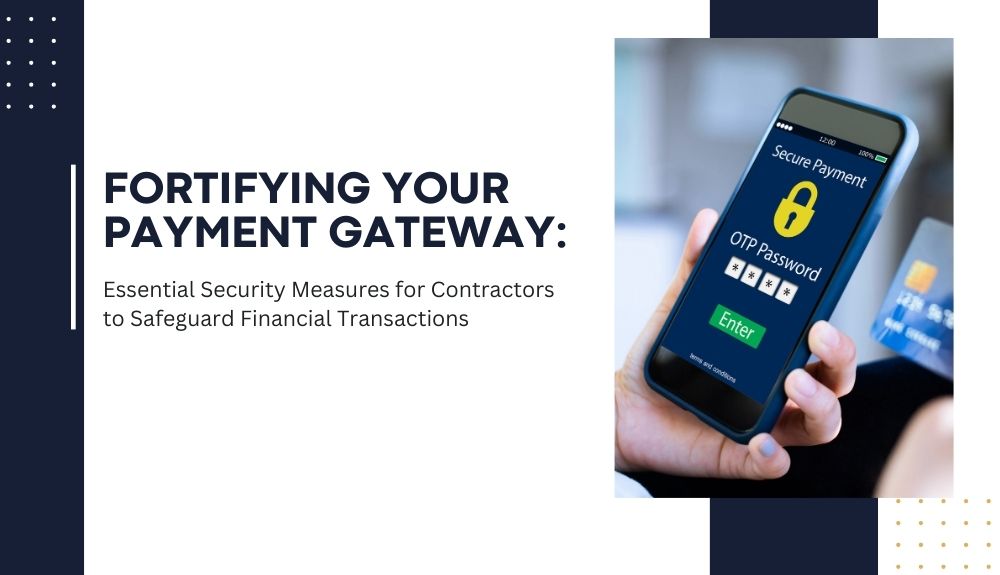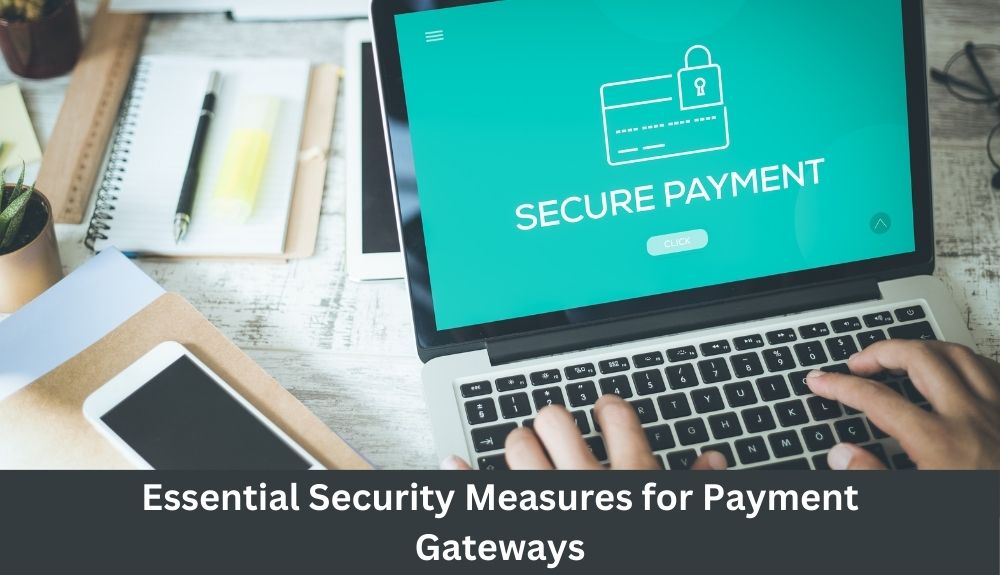
By alphacardprocess March 28, 2024
As a contractor, navigating the world of financial transactions can be both exciting and daunting. Payment gateways serve as the vital link between you and your clients when it comes to processing payments securely and efficiently. However, with great convenience comes great responsibility – ensuring the fortification of your payment gateway is paramount in safeguarding your hard-earned money. Join us as we delve into essential security measures that every contractor should implement to protect their financial transactions from potential threats. Let’s secure those digital wallets!
Importance of Securing Your Payment Gateway
In the digital age, contractors are increasingly relying on online payment gateways to facilitate financial transactions. Securing your payment gateway is crucial to protect sensitive information and prevent unauthorized access.
By implementing robust security measures, you can safeguard not only your own financial data but also that of your clients. A breach in your payment gateway can have far-reaching consequences, including financial loss and damage to your reputation.
Investing in the security of your payment gateway demonstrates professionalism and reliability to potential clients. It instills confidence in them that their payments will be processed safely and securely.
Moreover, adhering to industry standards for data protection not only protects against cyber threats but also ensures compliance with regulations. Prioritizing the security of your payment gateway is an investment in the long-term success of your contracting business.
Common Threats Faced by Contractors in Financial Transactions
Contractors often face various threats when it comes to financial transactions. One common threat is phishing attacks, where scammers impersonate legitimate entities to obtain sensitive information like login credentials or payment details. Another challenge is malware and ransomware, which can infect systems and compromise data security.
Man-in-the-middle attacks are also prevalent, where hackers intercept communication between parties to steal confidential information or manipulate transactions. Weak passwords and lack of multi-factor authentication make contractors vulnerable to unauthorized access to their payment gateway accounts.
Social engineering tactics, such as pretexting or baiting, can deceive contractors into revealing critical financial information unknowingly. Additionally, insecure networks or public Wi-Fi hotspots expose contractors to potential eavesdropping by cybercriminals seeking valuable data during transactions.
Essential Security Measures for Payment Gateways

Ensuring the security of your payment gateway is paramount in protecting your financial transactions as a contractor. Implementing essential security measures can safeguard sensitive data and prevent potential breaches.
One crucial measure is using strong passwords and enabling multi-factor authentication to add an extra layer of protection. Regularly updating software and applying patches help patch vulnerabilities that cybercriminals may exploit.
Encrypting data transmitted through the payment gateway ensures that information remains secure during transmission, making it harder for unauthorized parties to access sensitive details. Complying with PCI standards further strengthens the security posture of your payment gateway, instilling trust among clients.
Payment gateway providers play a vital role in ensuring security by implementing robust measures on their end. In case of a breach, swift action such as notifying relevant authorities and conducting thorough investigations is essential to mitigate any potential damage.
A. Strong Passwords and Multi-Factor Authentication
When it comes to securing your payment gateway as a contractor, one of the fundamental measures you should implement is using strong passwords. Avoid common phrases or easily guessable combinations; instead, opt for a mix of letters, numbers, and special characters.
Furthermore, adding an extra layer of protection with multi-factor authentication can significantly enhance the security of your financial transactions. This means that even if someone gets hold of your password, they would still need another form of verification to access sensitive information.
By incorporating these strategies into your payment gateway practices, you are fortifying your defenses against potential cyber threats and unauthorized access attempts. Remember, taking proactive steps to safeguard your financial data is crucial in today’s digital landscape.
B. Regular Software Updates and Patches
Regular software updates and patches are crucial to maintaining the security of your payment gateway. By ensuring that your software is up to date, you can protect against vulnerabilities that hackers may exploit. These updates often include important security fixes that address known issues in the system.
Hackers are constantly evolving their techniques, so it’s essential to stay one step ahead by keeping your software current. Ignoring updates could leave your payment gateway susceptible to attacks, putting your financial transactions at risk. Set up automatic updates whenever possible to streamline this process and ensure you don’t overlook any critical patches.
Remember that cyber threats are always looming, making it necessary for contractors to prioritize software maintenance as part of their security strategy. Stay vigilant and proactive in updating your systems regularly to fortify your defenses against potential breaches.
C. Encryption of Data
When it comes to securing your payment gateway as a contractor, encryption of data is a crucial aspect to consider. Encryption involves converting sensitive information into code that can only be accessed with the right decryption key.
By encrypting data, you ensure that any financial transactions or personal details exchanged through your payment gateway are protected from unauthorized access. This adds an extra layer of security to safeguard both your business and your clients’ sensitive information.
Utilizing strong encryption protocols helps prevent cybercriminals from intercepting and deciphering the data being transmitted between parties during online transactions. It’s like putting a secure lock on digital information, making it significantly more challenging for hackers to breach.
Implementing robust encryption practices not only helps maintain the integrity of your payment gateway but also builds trust with your clients by demonstrating your commitment to keeping their data safe and confidential.
D. PCI Compliance
When it comes to safeguarding financial transactions, PCI compliance is a crucial aspect that contractors need to prioritize. Payment Card Industry Data Security Standard (PCI DSS) sets the guidelines for securely processing payment card transactions.
Ensuring PCI compliance involves implementing robust security measures such as maintaining a secure network, protecting cardholder data, regularly monitoring and testing networks, and establishing strong access control measures.
Compliance with PCI standards helps in reducing the risk of data breaches, fraud, and other cyber threats that could compromise sensitive payment information. By adhering to these requirements, contractors can instill trust among their clients regarding the security of their financial transactions.
Contractors must understand the importance of staying updated on PCI compliance regulations and incorporating them into their payment gateway systems effectively. Failure to comply with these standards can result in severe consequences including fines or even suspension of payment processing capabilities.
Role of Payment Gateway Providers in Ensuring Security

When it comes to securing financial transactions for contractors, the role of payment gateway providers is crucial. These providers play a significant part in ensuring that sensitive data is protected throughout the payment process.
Payment gateway providers invest heavily in cutting-edge security measures to safeguard against potential threats such as fraud and data breaches. They employ sophisticated encryption techniques to protect transactional information from unauthorized access.
Moreover, these providers are responsible for maintaining compliance with industry standards such as PCI DSS (Payment Card Industry Data Security Standard) to ensure that all transactions meet stringent security requirements.
Additionally, payment gateway providers offer advanced monitoring tools and real-time alerts to detect any suspicious activities promptly. By actively monitoring transactions, they can prevent fraudulent attempts and mitigate risks effectively.
Partnering with a reputable payment gateway provider can give contractors peace of mind knowing that their financial transactions are well-protected from cyber threats.
Steps to Take in Case of a Security Breach
In case of a security breach, contractors should act swiftly to contain the situation. The first step is to immediately notify your payment gateway provider and work closely with them to address the issue. Next, inform your customers about the breach and advise them on steps they can take to protect their information. It’s crucial to conduct a thorough investigation into the breach to understand how it occurred and prevent future incidents.
Remember, proactive measures are key in safeguarding financial transactions. By implementing strong passwords, staying up-to-date with software updates, encrypting data, and complying with PCI standards, contractors can fortify their payment gateways against potential threats. Working hand-in-hand with reliable payment gateway providers who prioritize security will also play a vital role in ensuring safe transactions for both businesses and customers.
Stay vigilant, stay secure!